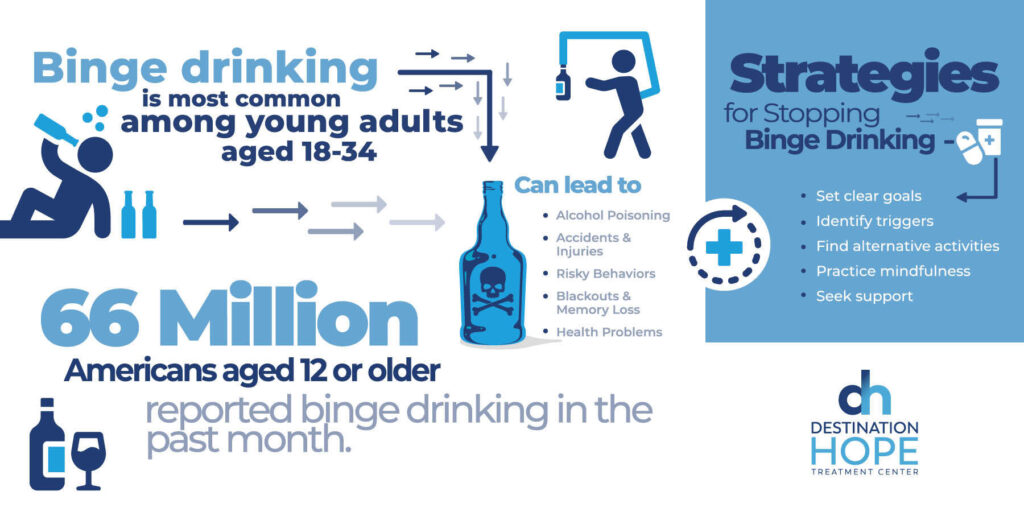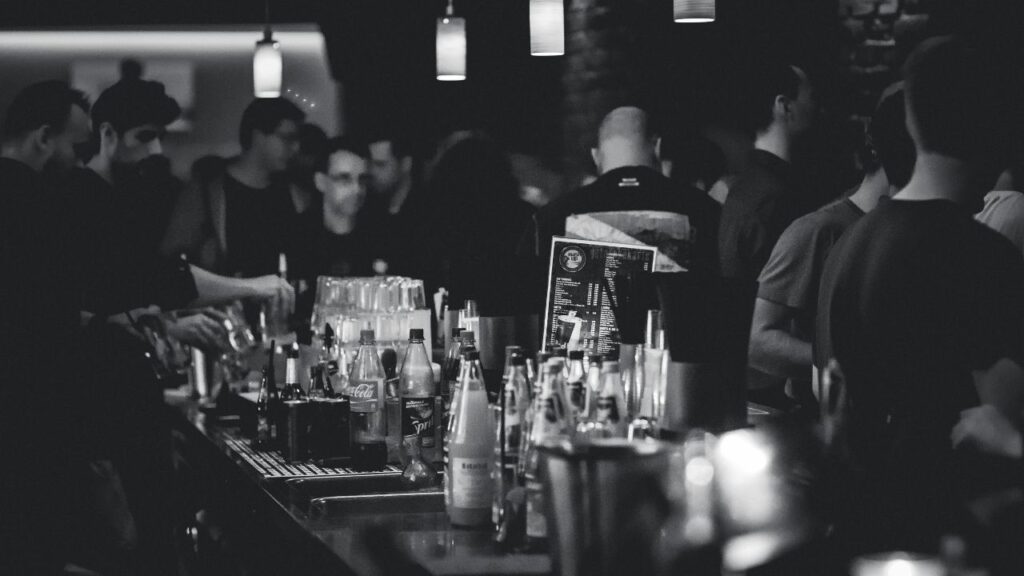Binge drinking is a serious and widespread problem in the United States, affecting millions of people and leading to a range of negative consequences. According to the National Institute on Alcohol Abuse and Alcoholism (NIAAA), binge drinking is defined as a pattern of alcohol consumption that brings a person’s blood alcohol concentration (BAC) to 0.08% or above. This typically corresponds to consuming five or more drinks for men or four or more drinks for women within a two-hour period. Binge drinking is not only dangerous in the short term but can also lead to the development of an alcohol use disorder (AUD) and various long-term health problems. If you or someone you know is struggling with binge drinking, it’s essential to seek help from a professional treatment center like Destination Hope in Fort Lauderdale, Florida.
The Prevalence and Risks of Binge Drinking
Binge drinking is most common among young adults aged 18-34, but it can affect people of all ages and backgrounds. According to the Substance Abuse and Mental Health Services Administration (SAMHSA), approximately 60 million Americans aged 12 or older have reported binge drinking. This alarming statistic highlights the widespread nature of the problem and the need for effective prevention and treatment strategies.

The risks associated with binge drinking are numerous and can have immediate and long-term consequences on an individual’s physical, mental, and social well-being. Some of the most significant risks include:
- Alcohol poisoning: Consuming large amounts of alcohol in a short period can lead to alcohol poisoning, a potentially life-threatening condition that requires immediate medical attention.
- Accidents and injuries: Binge drinking impairs judgment, coordination, and reaction time, increasing the risk of accidents, falls, and other injuries.
- Risky behaviors: Excessive alcohol consumption can lead to poor decision-making and engagement in risky behaviors, such as unprotected sex, driving under the influence, or violence.
- Blackouts and memory loss: Binge drinking can cause blackouts, periods of memory loss during which an individual continues to function but has no recollection of their actions.
- Health problems: Over time, repeated episodes of binge drinking can contribute to the development of chronic health conditions, such as liver disease, heart disease, high blood pressure, and certain types of cancer.
- Mental health issues: Binge drinking can exacerbate existing mental health problems, such as depression and anxiety, and may lead to the development of new mental health disorders.
- Social and occupational problems: Excessive alcohol use can strain relationships, lead to job loss, and cause financial difficulties.
Signs and Symptoms of an Alcohol Use Disorder
While not everyone who engages in binge drinking will develop an alcohol use disorder, it is a significant risk factor. An AUD is a chronic, relapsing brain disorder characterized by compulsive alcohol use, loss of control over alcohol intake, and a negative emotional state when not using. Some signs and symptoms that may indicate the presence of an AUD include:
- Drinking more or for longer than intended
- Unsuccessful attempts to cut down or stop drinking
- Spending a lot of time drinking or recovering from the effects of alcohol
- Craving alcohol
- Neglecting responsibilities at home, work, or school due to drinking
- Continuing to drink despite negative consequences
- Developing a tolerance, requiring more alcohol to achieve the desired effect
- Experiencing withdrawal symptoms when not drinking
If you recognize these signs in yourself or a loved one, it’s crucial to seek professional help to address the problem and prevent further harm.
Strategies for Stopping Binge Drinking
Making the decision to stop binge drinking is a significant first step, but it can be challenging to break the habit without the right tools and support. Here are some strategies that can help:
- Set clear goals: Determine whether you want to cut back on your drinking or quit altogether, and set specific, measurable goals to work toward.
- Identify triggers: Recognize the situations, people, or emotions that trigger your binge drinking episodes and develop a plan to avoid or cope with these triggers.
- Find alternative activities: Replace drinking with healthier activities that you enjoy, such as exercise, hobbies, or spending time with supportive friends and family members.
- Practice mindfulness: Pay attention to your thoughts and feelings around alcohol and develop strategies to manage cravings and stress without turning to drinking.
- Seek support: Reach out to trusted friends, family members, or a support group like Alcoholics Anonymous (AA) for encouragement and accountability.
- Consider professional treatment: If you’re struggling to stop binge drinking on your own, a specialized treatment center like Destination Hope can provide the comprehensive care and support you need to achieve lasting recovery.
The Importance of Professional Treatment
For individuals with a severe alcohol use disorder or those who have been unsuccessful in their attempts to stop binge drinking, professional treatment is often necessary. At Destination Hope, we offer a full continuum of care to address the complex nature of addiction and support our clients at every stage of their recovery journey.

Our treatment programs include:
- Medical detoxification: Our medically supervised detox program helps clients safely and comfortably withdraw from alcohol, managing symptoms and preventing complications.
- Residential treatment: Our residential program provides a structured, supportive environment where clients can focus on their recovery without the distractions and triggers of everyday life.
- Partial hospitalization program (PHP): Our PHP offers intensive treatment during the day while allowing clients to return home or to a sober living environment in the evenings.
- Intensive outpatient program (IOP): Our IOP provides a flexible treatment option for clients who have completed higher levels of care or have work or family obligations.
- Aftercare and relapse prevention: Our aftercare services help clients maintain their sobriety and navigate the challenges of early recovery through ongoing support, therapy, and relapse prevention planning.
At Destination Hope, we understand that each person’s journey to recovery is unique. That’s why we create individualized treatment plans tailored to each client’s specific needs, taking into account their personal history, co-occurring mental health disorders, and any other factors that may impact their recovery. Our experienced team of addiction specialists, including physicians, therapists, and counselors, works collaboratively to provide the highest quality care and support.
What We Offer
Our evidence-based treatment approach incorporates a range of therapies and interventions, such as:
- Individual therapy
- Group therapy
- Family therapy
- Cognitive-behavioral therapy (CBT)
- Dialectical behavior therapy (DBT)
- Motivational interviewing (MI)
- Trauma-focused therapy
- Holistic therapies (e.g., yoga, meditation, art therapy)
- Relapse prevention education
By addressing the underlying causes of addiction and equipping our clients with the tools and strategies they need to maintain long-term sobriety, we help them build a strong foundation for a healthier, more fulfilling life in recovery.
Take the First Step Toward Recovery
If you or a loved one is struggling with binge drinking or an alcohol use disorder, know that you are not alone, and help is available. At Destination Hope, we are committed to providing compassionate, comprehensive care to individuals and families affected by addiction. Our goal is to empower our clients to break free from the cycle of addiction and achieve lasting recovery.
Don’t let binge drinking control your life any longer. Take the first step toward a brighter future by contacting Destination Hope today at 954-302-4269. Our admissions team is available 24/7 to answer your questions, provide information about our treatment programs, and help you begin your journey to recovery. With the right support and guidance, you can overcome binge drinking and build the healthy, fulfilling life you deserve.

